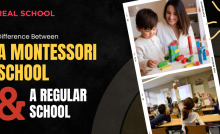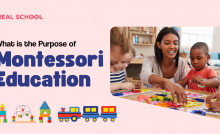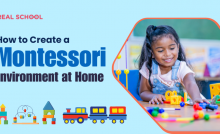Why Montessori Schools Are Ideal for Early Childhood Education


Introduction
Early childhood education is a critical period in a child’s development, shaping their learning attitudes and abilities for years to come. Montessori schools have gained recognition as an ideal option for early childhood education due to their unique approach to learning and focus on nurturing young minds. In this article, we will explore the reasons why Montessori schools are well-suited for early childhood education and how they contribute to the holistic development of young children.
- Child-Centered Learning
Montessori education is inherently child-centered, meaning that it places the child at the center of the learning process. In Montessori classrooms, teachers observe and respect each child’s individual interests, needs, and learning styles. This personalized approach ensures that children are engaged and motivated to explore the world around them, making learning a joyful and fulfilling experience.
- Hands-On Learning
Young children learn best through hands-on experiences, and Montessori schools excel at providing a rich environment for tactile exploration. Montessori classrooms are equipped with a wide array of educational materials that children can touch, manipulate, and explore independently. These materials are designed to foster sensory development and help children build a deep understanding of concepts through direct experience.
- Developmentally Appropriate Curriculum
Montessori education takes into account the specific developmental stages of early childhood. The curriculum is carefully designed to meet the needs of young learners, providing appropriate challenges while allowing for a sense of accomplishment. Children are introduced to activities that align with their cognitive, social, and emotional development, creating a strong foundation for future learning.
- Encouragement of Independence
Independence is a key aspect of Montessori education. From an early age, children in Montessori schools are encouraged to take responsibility for their daily activities and learning choices. They learn practical life skills, such as pouring, dressing, and cleaning up after themselves, fostering a sense of autonomy and self-confidence.
- Respect for Each Child
In Montessori schools, each child is respected as an individual with unique abilities and interests. Teachers create a supportive and nurturing environment, where children feel safe to express themselves and explore their creativity. This respect for the child’s individuality nurtures a positive self-image and a love for learning.
- Cultivation of Concentration and Focus
Through the use of carefully sequenced materials and uninterrupted work periods, Montessori education cultivates concentration and focus in young children. The freedom to choose their activities allows children to immerse themselves in tasks that capture their interest, leading to deeper levels of engagement and sustained attention.
- Social and Emotional Development
Montessori schools place a strong emphasis on social and emotional development. In mixed-age classrooms, children interact with peers of different ages, promoting empathy, cooperation, and leadership skills. Teachers guide children in resolving conflicts peacefully, laying the foundation for healthy social interactions.
- Preparation for Lifelong Learning
Montessori education instills a love for learning and a sense of wonder about the world. By nurturing a positive attitude towards education from an early age, Montessori schools prepare children to become enthusiastic and self-motivated learners throughout their lives.
- Integration of Arts and Nature
Montessori education integrates arts and nature into the learning process. Children are encouraged to express themselves through creative activities like painting, drawing, and music. Additionally, nature is often incorporated into the curriculum, allowing children to explore and appreciate the natural world.
- Joyful Learning Experience
One of the hallmarks of Montessori education is the joy and enthusiasm with which children approach learning. By creating an environment that supports curiosity, exploration, and self-discovery, Montessori schools ensure that early childhood education becomes a delightful journey of growth and development.
Conclusion
Montessori schools stand out as an ideal choice for early childhood education due to their child-centered approach, hands-on learning, and focus on nurturing independence and a love for learning. By providing a developmentally appropriate and supportive environment, Montessori education lays a strong foundation for children to become confident, creative, and lifelong learners.
FAQs (Frequently Asked Questions)
What age group is suitable for Montessori schools?
How do Montessori schools promote independence in young children?
What makes Montessori classrooms different from traditional early childhood education settings?
Do Montessori schools have a structured curriculum for young children?
What are the long-term benefits of early childhood education in Montessori schools?
Recent Posts
What are the Advantages of Online Teaching at The Real School?
In the article -"What are the Advantages of Online Teaching at The Real School?" we…
What is the Full Form of School?: Unveiling the Acronym
The term "school" carries profound significance in the realm of education, representing more than just…
What is Math Full Form?: Cracking the Code
Mathematics, often referred to as "Math," is a subject that elicits various reactions from students…
What is Full Form of Homework?: Decoding Academics
Homework, an integral part of the academic journey, often raises questions about its purpose and…
What is Full Form of Teacher?: Demystifying Education
In the intricate tapestry of education, teachers stand as the pillars shaping the intellectual and…
What is Real Education?: Discovering Its Essence and Impact
The concept of real education is evolving, transcending traditional views that equate it solely with…


